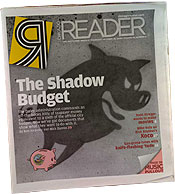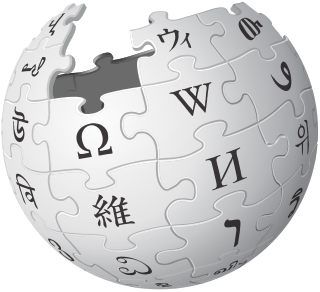
A wiki is a hypertext publication collaboratively edited and managed by its own audience directly. A typical wiki contains multiple pages for the subjects or scope of the project and could be either open to the public or limited to use within an organization for maintaining its internal knowledge base.

The Times is a British daily national newspaper based in London. It began in 1785 under the title The Daily Universal Register, adopting its current name on 1 January 1788. The Times and its sister paper The Sunday Times are published by Times Newspapers, since 1981 a subsidiary of News UK, in turn wholly owned by News Corp. The Times and The Sunday Times, which do not share editorial staff, were founded independently, and have only had common ownership since 1966. In general, the political position of The Times is considered to be centre-right.
goatse.cx, often referred to simply as Goatse, was originally an Internet shock site. Its front page featured a picture, entitled hello.jpg, showing a naked man, hunched over, widely stretching his anus with both of his hands to approximately the width of a grapefruit.

The Los Angeles Times is a daily newspaper that started publishing in Los Angeles in 1881 and is now based in the adjacent suburb of El Segundo. It has the fifth-largest circulation in the U.S. and is the largest American newspaper not headquartered on the East Coast. The paper focuses its coverage of issues particularly salient to the West Coast, such as immigration trends and natural disasters. It has won more than 40 Pulitzer Prizes for its coverage of these and other issues. As of June 18, 2018, ownership of the paper is controlled by Patrick Soon-Shiong, and the executive editor is Norman Pearlstine. It is considered a newspaper of record in the U.S.
Open-source journalism, a close cousin to citizen journalism or participatory journalism, is a term coined in the title of a 1999 article by Andrew Leonard of Salon.com. Although the term was not actually used in the body text of Leonard's article, the headline encapsulated a collaboration between users of the internet technology blog Slashdot and a writer for Jane's Intelligence Review. The writer, Johan J. Ingles-le Nobel, had solicited feedback on a story about cyberterrorism from Slashdot readers, and then re-wrote his story based on that feedback and compensated the Slashdot writers whose information and words he used.
Dan Neil is an automotive columnist for The Wall Street Journal and a former staff writer at the Los Angeles Times, AutoWeek and Car and Driver. He was a panelist on 2011's The Car Show with Adam Carolla on Speed Channel.

The Chicago Reader, or Reader, is an American alternative weekly newspaper in Chicago, Illinois, noted for its literary style of journalism and coverage of the arts, particularly film and theater. It was founded by a group of friends from Carleton College.

The Orange County Register is a paid daily newspaper published in California. The Register, published in Anaheim, is owned by Digital First Media. Freedom Communications owned the newspaper from 1935 to 2016.
Neil Steinberg is an American news columnist for the Chicago Sun-Times and an author. He joined the paper's staff in 1987.
Village Voice Media or VVM began in 1970 as a weekly alternative newspaper in Phoenix, Arizona. The company, founded by Michael Lacey (editor) and Jim Larkin (publisher), was then known as New Times Inc. (NTI) and the publication was named New Times. The company was later renamed New Times Media.

Murray S. Waas is an American independent investigative journalist known most recently for his coverage of the White House planning for the 2003 invasion of Iraq and ensuing controversies and American political scandals such as the Plame affair. For much of his career, Waas focused on national security reporting, but has also written about social issues and corporate malfeasance. His articles about the second Iraq war and Plame affair matters have appeared in National Journal, where he has worked as a staff correspondent and contributing editor, The Atlantic, and, earlier The American Prospect.

Wikipedia is a multilingual open online encyclopedia written and maintained by a community of volunteers through open collaboration and a wiki-based editing system. Individual contributors, also called editors, are known as Wikipedians. Wikipedia is the largest and most-read reference work in history. It is consistently one of the 15 most popular websites ranked by Alexa; as of 2022, Wikipedia was ranked the 10th most popular site. It is hosted by the Wikimedia Foundation, an American non-profit organization funded mainly through donations.
David Shaw was an American journalist. He was best known for his reporting for the Los Angeles Times, where he was awarded the Pulitzer Prize for Criticism in 1991. He wrote criticism of food, wine, and film, but is perhaps best known for taking a critical eye on the media itself.

Frederick Theodore Rall III is an American columnist, syndicated editorial cartoonist, and author. His political cartoons often appear in a multi-panel comic-strip format and frequently blend comic-strip and editorial-cartoon conventions. The cartoons used to appear in approximately 100 newspapers around the United States. He was president of the Association of American Editorial Cartoonists from 2008 to 2009.

Conservapedia is a conspiracist English-language wiki-based online encyclopedia project written from a self-described American conservative and fundamentalist Christian point of view. The website was established in 2006 by American homeschool teacher and attorney Andrew Schlafly, son of the conservative activist Phyllis Schlafly, to counter what he perceived as a liberal bias in Wikipedia. It uses editorials and a wiki-based system for content generation.

The Guardian is a British daily newspaper. It was founded in 1821 as The Manchester Guardian, and changed its name in 1959. Along with its sister papers The Observer and The Guardian Weekly, The Guardian is part of the Guardian Media Group, owned by the Scott Trust. The trust was created in 1936 to "secure the financial and editorial independence of The Guardian in perpetuity and to safeguard the journalistic freedom and liberal values of The Guardian free from commercial or political interference". The trust was converted into a limited company in 2008, with a constitution written so as to maintain for The Guardian the same protections as were built into the structure of the Scott Trust by its creators. Profits are reinvested in journalism rather than distributed to owners or shareholders. It is considered a newspaper of record in the UK.
A series of incidents in 2009 led to Church of Scientology-owned networks being blocked from making edits to Wikipedia articles relating to Scientology. The Church of Scientology has long had a controversial history on the Internet and had initiated campaigns to manipulate material and remove information critical of itself from the web. From early in Wikipedia's history, conflict arose within the topic of Scientology on the website. Disputes began in earnest in 2005, with users disagreeing about whether or not to describe Scientology as an abusive cult or religion. By 2006, disagreements concerning the topic of Scientology on Wikipedia had grown more specific. Wikipedia user and Scientology critic David Gerard commented to The Daily Telegraph in 2006 that some articles were neutral due to a requirement to reference stated facts.
Katharine Sophie Viner is a British journalist and playwright. She became the first female editor-in-chief at The Guardian on 1 June 2015 succeeding Alan Rusbridger. Viner previously headed The Guardian's web operations in Australia and the United States, before being selected for the editor-in-chief's position.
Mass amateurization refers to the capabilities that new forms of media have given to non-professionals and the ways in which those non-professionals have applied those capabilities to solve problems that compete with the solutions offered by larger, professional institutions. Mass amateurization is most often associated with Web 2.0 technologies. These technologies include the rise of blogs and citizen journalism, photo and video-sharing services such as Flickr and YouTube, user-generated wikis like Wikipedia, and distributed accommodation services such as Airbnb. While the social web is not the only technology responsible for the rise of mass amateurization, Clay Shirky claims Web 2.0 has allowed amateurs to undertake increasingly complex tasks resulting in accomplishments that would seem daunting within the traditional institutional model.

WikiTribune was a news wiki where volunteers wrote and curated articles about widely publicised news by proof-reading, fact-checking, suggesting possible changes, and adding sources from other, usually long established outlets. Jimmy Wales, co-founder of Wikipedia, announced the site in April 2017 as a for-profit site, not affiliated with Wikipedia or its support organisation, the Wikimedia Foundation. Until October 2018, WikiTribune employed journalists with established backgrounds in the profession who researched, syndicated, and reported news.










